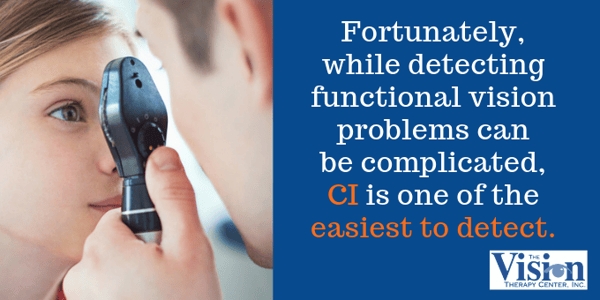
Convergence insufficiency is a relatively unknown vision problem that affects up to 8.3% of kids and the prevalence is likely similar in adults. Even with such a high rate of occurrence, optometrists have not always been able to detect the most common types of CI -- until now.Luca Jankowski was a 9-year-old boy who was having problems reading, and he was struggling in school. His mother, Dr. Amy Jankowski, is an optometrist herself, and had tested Luca. He had 20/20 vision, and passed a basic binocular exam. But he continued to struggle.

Luca Jankowski
Dr. Jankowski knew she was missing something. So like any good primary care doctor, she reached out to a specialist.
How Luca’s Vision Problem Went Undetected
When Luca was struggling, Dr. Jankowski had a feeling it might be a vision problem, even though her son had passed the tests she had administered.

Dr. Amy Jankowski
Dr. Jankowski is a primary care optometrist at Metro Eye. For years, she had been referring patients with “functional vision problems” to The Vision Therapy Center.
Functional vision involves the entire visual system, and visual skills including eye movement, eye tracking and eye focus. How all these visual skills work together affect things like your depth perception, or your ability to track words along a line of text.
Developmental optometrists, such as the doctors at The Vision Therapy Center, have received additional training and use specialized equipment to detect and treat functional vision problems. Many of these fall outside the realm of care for primary ODs like Dr. Jankowski.
But Luca’s case would prove to be different.
Over 70,000 Potential Cases in Milwaukee and Madison Alone
Dr. Jankowski took Luca to The Vision Therapy Center, where he was diagnosed with “Convergence Insufficiency.”
Convergence insufficiency is a problem with eye teaming that primarily affects a person’s performance on tasks within arm’s length. In order to view objects that are close to you, your eyes have to move in towards your nose, or converge.
Luca subsequently received treatment from The Vision Therapy Center, and has dramatically improved. (Check out his success story here.)
But the story doesn’t end there.

Dr. Jankowski was upset that she had not detected the convergence insufficiency. “I missed this, and I don’t want to miss it again,” she told the doctors at The Vision Therapy Center. “You have to teach me how to test for it.”
With CI occuring in 8.3% of children and adults, Dr. Jankowski knew that other optometrists might be missing the diagnosis as well.
Let’s not underestimate just how much of the population is represented by 8.3%. If you consider the population of the cities of Milwaukee and Madison, that’s just over 70,000 potential cases.
|
Population of Milwaukee |
Population of Madison |
CI prevalence (8.3%) and potential total cases |
|
599,086 |
248,856 |
70,379 |
Developing a Way to Help Primary ODs Diagnose and Treat Mild Cases of CI
Dr. Jankowski and The Vision Therapy Center team wondered if there was a way to help primary ODs diagnose and even potentially treat patients with CI.

Fortunately, while detecting functional vision problems can be complicated, CI is one of the easiest to detect.
The doctors at The Vision Therapy Center reviewed the current medical literature and found a simple, evidence-based approach to diagnosing and treating mild cases of CI. It can be performed by primary care optometrists like Dr. Jankowski in their own offices.
More complicated cases would still need to be referred out to developmental optometrists, but this would definitely help ODs address cases like Luca’s.
What if You Suspect You Have Convergence Insufficiency?
When you have difficulty converging your eyes or sustaining convergence, it can lead to the following symptoms:
- Double Vision
- Blurry Vision
- Headaches
- Fatigue
- Eye Strain
- Eye Pain
- Light Sensitivity
Additionally, a person with CI may also experience:
- Difficulty Maintaining Attention on Tasks
- Reduced Efficiency and Productivity
- Diminished Performance with Time
- Loss of Place When Reading
If you notice these symptoms, you have two options:
- Consult with your optometrist and ask about the testing mentioned here.
- Take the Vision Quiz (click on the button below) to determine if you should get a Functional Vision Exam.


